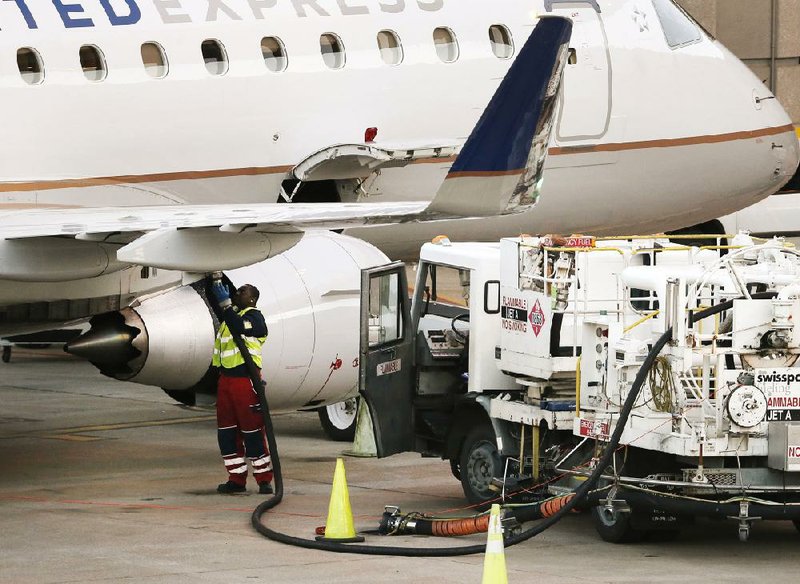Airlines are expected to see a big jump in revenue this year as the cost of jet fuel declines. An international airline trade group said airfares will shrink 5 percent as a result of cheaper fuel, but some analysts say it will be a while before passengers flying out of Little Rock or Northwest Arkansas see lower prices.
Flights are full, so airlines have no need to drop prices, something normally done to entice more people to fly, said Bob McAdoo, senior airline analyst with Imperial Capital LLC.
"There's no incentive to lower prices," McAdoo said.
Still, the International Air Transport Association said falling fuel prices will lower the price of a round-trip flight by 5 percent in 2015 to a worldwide average of $458.
American Airlines on Tuesday listed a round-trip flight in May from Little Rock to Dallas-Fort Worth International Airport for $175. A 5 percent decrease would lower the price to $166.25.
Fuel is the largest expense for airlines, representing about a third of their costs. Airlines in North America spent about $45.7 billion on fuel in 2014, according to a report this month by Morgan Stanley. With jet fuel prices down almost 50 percent from the same period a year ago, analysts predict that airlines will see some cost savings -- up to $20 billion, according to some.
The first priority for airlines will be to use capital to reduce debt and purchase their own shares, according to industry analysts and other trade groups.
"Over time, airfares will track closely with airline costs, but in the short term, improving cash flow may be used to reduce debt, reward [and] retain employees and shareholders and improve the product," said Melanie Hinton, spokesman for trade group Airlines for America, in an email.
The price of jet fuel has fallen as oil prices have weakened. Oil has fallen from more than $100 per barrel last summer to less than $50 a barrel in recent weeks. Domestic crude fell $2.30 Tuesday to settle at $46.39 a barrel on the New York Mercantile Exchange. Brent crude fell 85 cents to close at $47.99 a barrel in London.
Consumers are also expected to see savings -- about $750 per household -- on gasoline this year, according to the U.S. Energy Information Administration.
"With oil prices cut in half the past few months and modest hedge levels, the benefit to [airlines] may be large," the Morgan Stanley report said. Morgan Stanley also raised its fiscal 2015 earnings estimates for the airlines industry by 27 percent because of lower fuel prices.
Some companies are already seeing the benefit of lower fuel prices. Delta Air Lines Inc. on Tuesday posted a fourth-quarter profit of $649 million, up from last year's $558 million, as a result of savings on fuel expenses.
"As we begin 2015, we have a significant opportunity from lower fuel prices, which will drive more than $2 billion in fuel savings over 2014," said Richard Anderson, Delta chief executive officer, in a statement.
It takes several weeks for airlines to reap the benefits of lower fuel prices, and sometimes longer for companies that hedge their fuel to protect themselves from the volatile oil market.
Hinton, with the industry trade group, said expenses for airlines have also increased while their margins and capital returns are still "subpar, and balance sheets are overwhelmingly still not investment-grade."
"So until we can adequately reduce debt, return cash to shareholders, renew our fleets and share profits with employees, there is still work to be done," she said.
While there will likely be some softening in airfare prices, it will be limited in the United States where there is less competition among airlines -- the result of company consolidation, said Adam Pilarski, senior vice president of Avitas Inc.
"Other parts of the world where you have more competition, fares will be coming down stronger," he said. "People will have more money, which is good for airlines because then people can afford to take trips and airlines can afford to lower fares and still make decent money."
A Section on 01/21/2015
